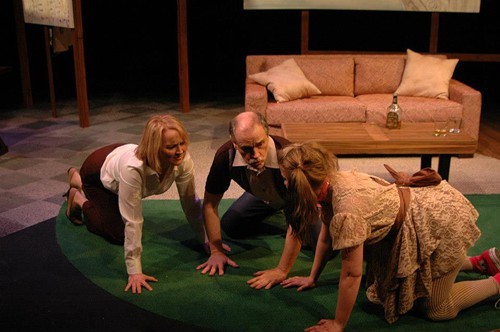
- Theatre Memphis
- Bonnie, Tony, Sylvia
As Greg, a man in the throes of a mid-life crisis, Randy Hartzog took the less-is-more approach and came out on top. Greg’s a man who loves his dog (and what’s wrong with that?). And he’s confused by an increasingly hermetic world that has disease-a-fied even the mildest imitation of passion.
Okay, that was a false start. But that’s what I wrote, more or less, in the year of our Lord nineteen hundred and-mumblemumblmumble, when I reviewed the second (I think) of director Ann Marie Hall‘s three productions of Sylvia. Flash forward (mumblemumble) years and Hartzog, who knows the piece intimately, is in the director’s chair at Theatre Memphis, staging one of the shaggy dog story’s best productions yet. The set: perfect. The cast: perfect. Lighting, costumes, sound design: Perfect, perfect, perfect.
So why did dead-half of a show I thought I (mostly) liked leave me colder than a polar bear’s dirty martini? I’ve been asking myself, and friends, the same question.
Sylvia is still the story of two New York empty-nesters and (of course) Sylvia, the stray dog that comes between them. It’s yet another A.R. Gurney sitcom, featuring a variety of WASPy dilemmas served on a bed of WASPy relationships, dusted with WASPy wit, and smothered in sentimentality. Scary? Very. Awful? By no means. It’s a real Scooby snack: a sweet that would rot your teeth in no time given a steady diet of the stuff. Delicious? Yes. Nutritious? Probably not, but it tastes so good, who cares?
That last paragraph, is also from a past review, mostly.
Aliza Moran‘s performance as the home-wrecking mutt might provide a bit of insight for theologians wrestling with the concept of a being both fully human, and fully divine. She’s one hundred percent human and completely canine. If all performances had this degree of specificity and commitment there would be no need for critics — it would all be good.
As Greg, a man in the throes of a mid-life crisis, Tony Isbell takes the less-is-more approach and comes out on top. He is a man who loves his dog (and what’s wrong with that?) and… wait, isn’t this where we came in?
Sylvia has moments of inspired, if lowbrow comedy. When a dog calls a cat a cocksucker, that’s just funny. But the show hasn’t aged especially well. The problem is Kate, Greg’s wife, a teacher re-entering the workforce after the last kid has gone off to college. She’s got a WASPY savior complex, and is driven to bring Shakespeare to inner city kids with their raps and rhymes. She is, at once, the only responsible adult in the show, and the villain of the piece. Most of the piece anyway.
When Greg brings a dog home Kate—strongly portrayed by Bonnie Daws Kourvelas— puts her foot down. Because dogs require a lot of work and something about her career and teaching Shakespeare to inner city kids. Her position never fluctuates. Until the play absolutely positively has to end.
She’s a straw wife, existing only to serve a few functional purposes. Our modern woman provides the show a modicum of conflict and social context but in the end she’ll compromise her dreams to allow for her husband’s mid-life indulgences. And they live happily ever after, more or less.
Sylva’s obviously not just a dog. She’s a stand in for many possibilities: A sports car, some extreme hobby, or a common affair. The dog is literally another woman, and jokes about her cute little ass are an end run around straight objectification.
But it’s funny, right?
When it’s funny, it’s very funny. Moran, a strong, physically changeable performer with a real knack for comedy gives as virtuoso a performance as you’re likely to see this season. Spencer Miller is superb as both a dog loving bro and a profoundly white woman.
But I don’t think I like this play very much. And when this Sylvia finally runs off, I hope she stays gone.
And she’s gone after this weekend.
Ticket information here.